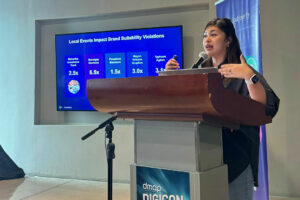AI-driven ad fraud worries Asia-Pacific marketers
OVER 50% of marketers in Asia-Pacific (APAC) are worried about the harmful effects of artificial intelligence (AI)-driven fraud on advertising, according to a report. “As AI becomes even more widespread, fraudsters have easier access to tools that can amplify fraud schemes,” DoubleVerify (DV), a software platform for digital measurement and analytics, said in its Global […]

OVER 50% of marketers in Asia-Pacific (APAC) are worried about the harmful effects of artificial intelligence (AI)-driven fraud on advertising, according to a report.
“As AI becomes even more widespread, fraudsters have easier access to tools that can amplify fraud schemes,” DoubleVerify (DV), a software platform for digital measurement and analytics, said in its Global Insights: 2024 Trends report.
The rising adoption of AI technologies in the Philippines has resulted in more sophisticated AI-driven fraud schemes that target high-value media environments, said Tinee Cruz, senior sales director of DV Philippines.
Real-time detection is essential to combat these fraud schemes, according to Ms. Cruz, highlighting tools like fraud and classification AI.
“With AI becoming a key tool in fraudsters’ arsenal, new fraud schemes have seen a significant increase with a 23% growth in 2023. Fraudsters are using machines to emulate human behavior better than before and evading standard detection mechanisms,” DV said.
“Tools that cater to challenges amplified by AI enable brands to detect fraudulent activities quickly and ensure that their digital ads are aligned with media quality as well as with standards in brand suitability. By using these technologies, brands can protect their investments and improve the overall quality of their advertising,” it added.
One of the most extensive Connected TV (CTV) ad fraud schemes unveiled by DV is CycloneBot, a malicious bot that can generate up to 250 million falsified ad requests and imitates around 1.5 million devices daily.
DV said the scheme can cause a $7.5-million monthly financial impact to unprotected advertisers.
The report said the global ad fraud rate averaged 1.1%.
Still, the fraud/sophisticated invalid traffic (SIVT) violation rate in APAC remained the lowest globally at 0.8%, declining by 22% from the year-ago level. The Philippines had a 0.7% fraud rate, decreasing by 43%, the report showed.
“Despite seeing an 85% decrease in its Connected TV Fraud Rate, CTV remains the device with the highest fraud rate in APAC,” it said.
DV said 37% of fraud/SIVT in APAC happens via mobile apps, with 92% of all adware/malware SIVT in the region driven by mobile apps.
Ms. Cruz said the evolution of AI technology presents an opportunity for brands to enhance their campaign performance while defending against emerging threats to media quality.
According to the report, 60% of APAC marketers said AI-driven campaign optimization has a positive impact on media quality and plan to use AI technologies like data analysis tools over the next 12 months.
“Globally, APAC drives the highest overall attention, with an average Attention Index of 124… The focus on mobile usage in APAC is reflected in its high engagement with mobile web display ads and in-app video ads, which capture, respectively, 65% and 84% more attention than the DV baseline. This suggests that advertisers are optimizing their strategies for mobile environments,” it added. — Almira Louise S. Martinez























